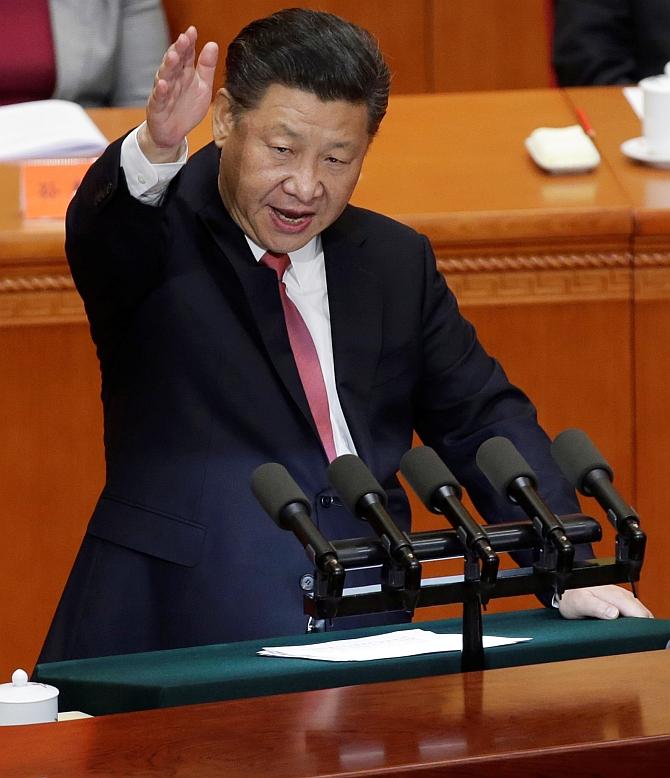At a time when Donald Trump is making belligerent noises, Chinese President Xi Jinping responds by overhauling the People's Liberation Army and restructuring the command of the PLA Navy to emphasise Beijing's resolve to dominate the South China Sea.
Former senior RA&W officer Jayadeva Ranade explains what is going on.

Barely ten months before the 19th Party Congress assembles in Beijing towards the end of this year, Chinese Communist Party chief and China's Central Military Commission Chairman Xi Jinping took a major step towards operationalising an integrated command structure in the People's Liberation Army and clearly outlined the future shape of the PLA's Theatre Commands created early last year.
In mid-January 2017, Xi initiated the process of appointing younger, professionally qualified officers to the higher echelons of the PLA.
A surprise disclosure was made by the Hong Kong-based South China Morning Post on January 15, 2017, which cited independent sources to say that nearly 50 senior officers are being retired, including 18 full-ranking generals.
As on the occasion of the 18th Party Congress in November 2012, now too it appears that high-level military appointments, including to the Central Military Commission, will be made and announced before the Party Congress.
With this batch of retirements, the number of PLA officers of the rank of major general and above who have been dismissed or retired since Xi took over as CMC chairman exceeds 135!
Xi appears keen on selecting younger, professional, officers of his choice for key slots in the PLA and as members of the CMC.

Reflecting the importance accorded to the PLA Navy and developments in the South China Sea, the official English language China Daily and Global Times separately confirmed on January 21, 2017, that 1956 born Vice- Admiral Shen Jinlong had been appointed commander of the PLA Navy.
Other official reports disclosed that Vice-Admiral Yuan Yubai, a nuclear submariner, has been appointed commander of the PLA's Southern Theatre Command.
He is the first PLAN officer to break the monopoly of the PLA ground forces and head a Theatre Command since they were created early last year.
As commander of the PLA's Southern Theatre, Vice-Admiral Yubai's operational jurisdiction includes the South China Sea and Indian Ocean.
Also born in 1956, Vice-Admiral Yubai came into the spotlight at the Shangrila Dialogue in Singapore in September 2015 when, as commander of the PLAN's North Sea Fleet, he emphatically declared that the South China Sea belongs to China.
'The South China Sea, as the name indicates, is a sea area that belongs to China,' the admitral declared. 'And the sea from the Han dynasty a long time ago where the Chinese people have been working and producing from the sea.'
Vice-Admiral Yubai studied at the Qingdao Submarine Academy and spent his entire career in the North Sea Fleet commanding Han class submarines. He has commanded the PLAN's 1st Submarine Base.
In 2013, he led China's 14th Counter Piracy Task Group to the Gulf of Aden and in July 2014 was promoted as North Sea Fleet Commander.

At a time when US President Donald Trump is making belligerent noises, Vice-Admiral Yubai's appointment as Southern Theatre commander emphasises China's resolve to dominate the South China Sea.
It also emphasises the maritime role of the PLA's Southern Theatre, which was created early last year, and gives notice of an enhanced role for submarines in the Asia-Pacific.
Vice-Admiral Shen Jinlong replaces 71-year-old Admiral Wu Shengli as PLAN commander.
The Hong Kong-based Chinese-language daily Ming Pao called Jinlong's appointment a 'surprise' to many people.
Official Chinese media reports said Jinlong's new appointment was disclosed during am video chat on January 20, 2017, morning with officers and sailors of the 25th escort fleet to the Gulf of Aden.
In the video address, Admiral Jinlong 'encouraged the sailors to strive to make greater contributions to the protection of national sovereignty, security and development interests.'
Admiral Jinlong commanded a North Sea Fleet destroyer flotilla for several years before his appointment as director of a Vessel Training Centre in the North Sea Fleet in 2003. He later commanded the Lushun Naval Support Base.
On December 1, 2008, the People's Daily published an article titled 'Naval Non-Combat Military Operations: Challenges Faced and Counter-Measures' by Jinlong, who was identified as a commander of a North Sea Fleet Support Base.
Later in 2009, he wrote an article on Naval Operations Other Than War, after which he was appointed commandant of the Dalian Naval Academy.
He later commanded the Naval Command College in Nanjing and in August 2014, was appointed deputy commander of the South Sea Fleet.
Four months later he was promoted as commander of the South Sea Fleet.
He commanded the Chinese navy squadron that took part in Rim of the Pacific exercises out of Pearl Harbour in 2014 and has attended the International sea-power symposium held in September 2016 at the US Naval War College in Newport, Rhode Island.
As PLAN Commander, Shen Jinlong will be a member of the CMC.

Another appointment of interest was that of Vice- Admiral Wang Hai, former deputy commander of the PLAN, who was promoted commander of the South Sea Fleet.
He had served in the South Sea Fleet for a long time and his return to the fleet underscores its importance to the leadership.
It is the only fleet that has nuclear ballistic missile submarines and an aircraft carrier under its command.
In September 2012, when China's first aircraft carrier, the Liaoning was commissioned, Vice-Admiral Wang was the first commander of the PLAN aircraft carrier battle group.
Other appointments announced were of Rear Admiral Zhang Wendan, former deputy chief of staff of the Southern Theatre Command, who has been promoted as commander of the North Sea Fleet and Rear Admiral Wei Gang, former deputy commander and chief of staff of the Southern Theatre Command, who was promoted commander of the East Sea Fleet.
Jayadeva Ranade, former additional secretary in the Cabinet Secretariat, Government of India, is president of the Centre for China Analysis and Strategy.






 © 2025
© 2025